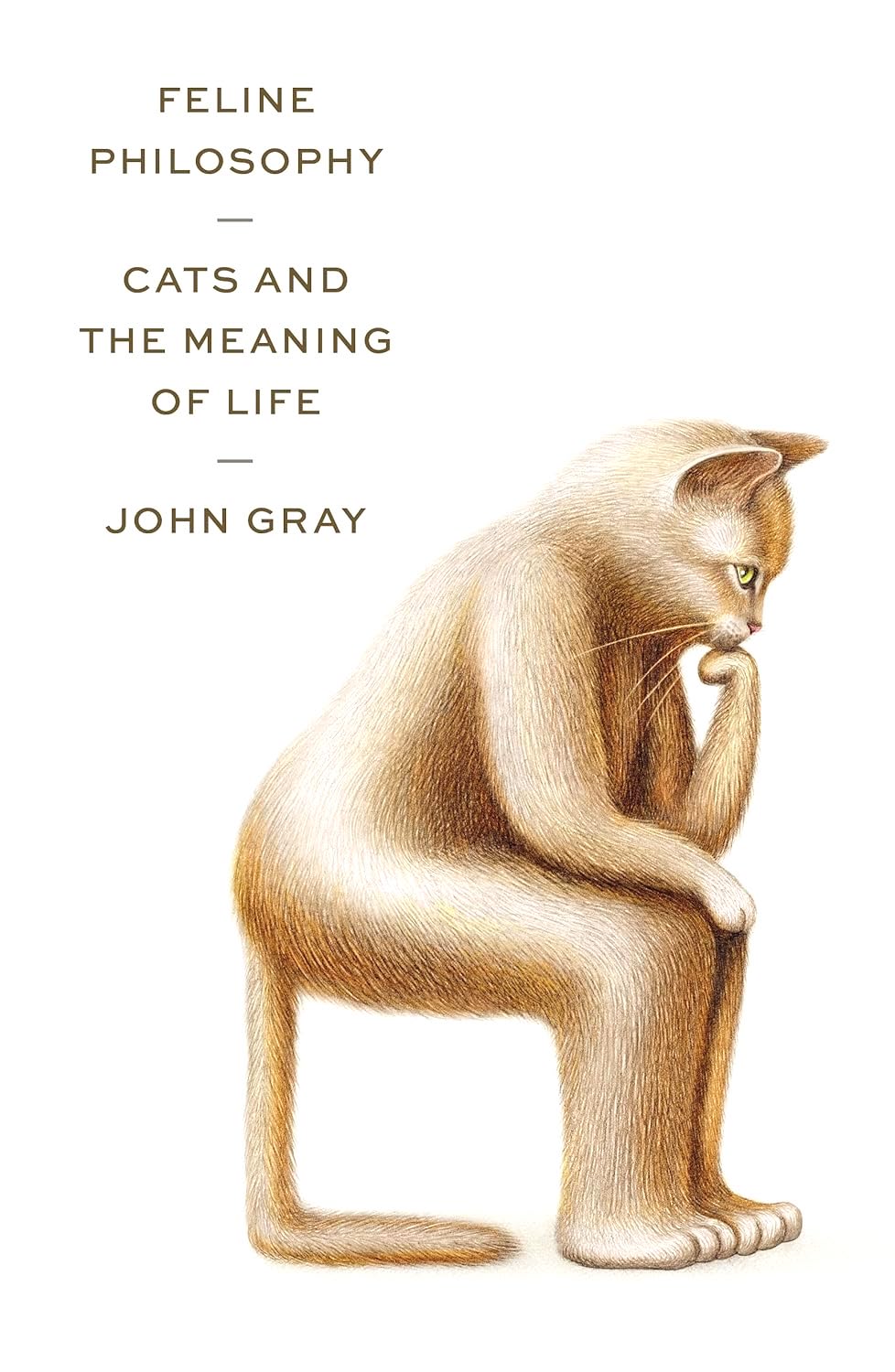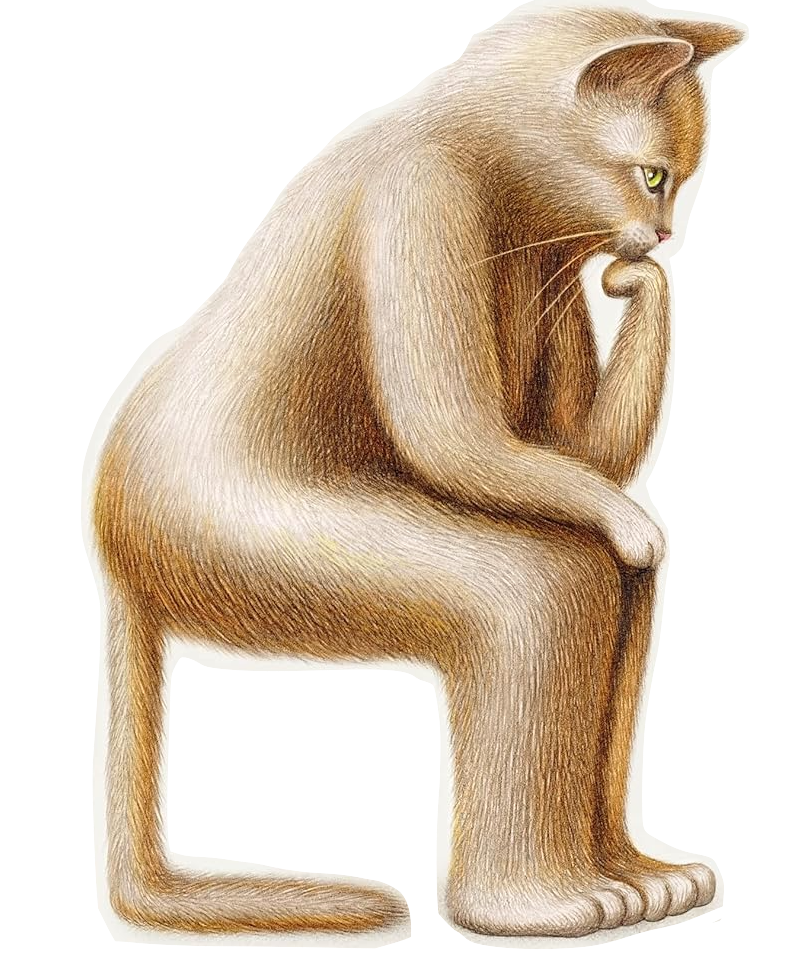
ねこの哲学
Feline philosophy
☆ 書誌の説明:「「私が猫と遊んでいるとき、私が猫を相手に暇つぶしをしているのか、猫が私を相手に暇つぶしをしているのか、私にはわからない。」これはモ ンテーニュの言葉。政治哲学者ジョン・グレイ(John Gray, b.1948)は本書で、何世紀にもわたる哲学や、コレット、ハイスミス、谷崎らの小説を渉猟し、人が猫にどう反応し行動す るかを定めてきた複雑で親密なつながりを探究している。その核心にあるのは猫への感謝の念だ。なぜなら、どんな動物にもまして猫は、人間という孤独な存在 にもそなわっている動物本性を感じさせてくれるからである。」https://ci.nii.ac.jp/ncid/BC10852537
★
著者について「ジョン・ニコラス・グレイ(1948年4月17日生まれ)は、分析哲学、思想史[1]、哲学的ペシミズムに関心を持つイギリスの政治哲学
者、作家。
2008年にロンドン・スクール・オブ・エコノミクス・ポリティカル・サイエンスのヨーロッパ思想スクール教授を退任。グレイは意志、ひいては道徳を幻想
とみなし、人類を他の生命体を絶滅させようとする貪欲な種として描いている。グレイは「人間は......地球を破壊することはできないが、自分たちを支
える環境を簡単に破壊することができる」と書いている。」ジョン・ニコラス・グレイ)
目 次
1 猫と哲学
2 猫はどうして必死に幸福を追求しないのか
3 猫の倫理
4 人間の愛vs猫の愛
5 時間、死、そして猫の魂
6 猫と人生の意味
★観察者としての「猫」そして、猫は思索するのか?
狩るというご先祖さまからの(遺伝的)性質が、覗き見ることの潜在力を維持しているわけである。



★
| ジョン・グレイの『猫類哲学』の10の教え |
|
| 1. 人間に対して理性的になれと説得しない |
1. Never try to persuade human beings to be reasonable |
| 2. 時間が足りないと嘆くのは馬鹿げている |
2. It is foolish to complain that you do not have enough time |
| 3. 苦しみに意味を見出すのはやめよ |
3. Do not look for meaning in your suffering |
| 4. 他人を愛さなくてはならないと感じよるよりも、無関心でおれ |
4. It is better to be indifferent to others than to feel you have to love them |
| 5. 幸福追求をやめると、別の幸福がえられるかもしれない |
5. Forget about pursuing happiness, and you may find it |
| 6. 人生は物語ではない |
6. Life is not a story |
| 7. 闇を恐れるな、大事なものは夜にみつかる |
7. Do not fear the dark, for much that is precious is found in the night |
| 8. 眠る喜びのために眠れ |
8. Sleep for the joy of sleeping |
| 9. 幸福にしてあげると言ってくれるひとには用心しなさい |
9. Beware anyone who offers to make you happy |
| 10. 猫のようになれなかったら、悔しがらずに気晴らしという人間的世界に戻りなさい |
10. If you cannot learn to live a little more like a cat, return without regret to the human world of diversion |
★
| はじめに |
|
| 1 猫と哲学 |
1. Cats and Philosophy 1.1 A cat-loving anti-philosopher: Michel de Montaigne 1.2 Mèo’s journey 1.3 How cats domesticated humans |
| 2 猫はどうして必死に幸福を追求しないのか |
2. Why Cats Do Not Struggle to Be Happy 2.1 When philosophers talk of happiness 2.2 Pascal on diversion 2.3 Hodge and the Fall |
| 3 猫の倫理 |
3. Feline Ethics 3.1 Morality, a very peculiar practice 3.2 Spinoza on living according to your nature 3.3 Selfless egoism |
| 4 人間の愛vs猫の愛 |
4. Human vs Feline Love 4.1 Saha’s triumph 4.2 Ming’s biggest prey 4.3 Loving Lily 4.4 Gattino vanishes |
| 5 時間、死、そして猫の魂 |
5. Time, Death and the Feline Soul 5.1 Muri’s farewell 5.2 Civilization as death-denial 5.3 Cats as gods |
| 6 猫と人生の意味 | 6. Cats and the Meaning of Life 6.1 Cat nature, human nature 6.2 Ten feline hints on how to live well 6.3 Mèo on the window ledge |

| John Nicholas Gray
(born 17 April 1948) is an English political philosopher and author
with interests in analytic philosophy, the history of ideas,[1] and
philosophical pessimism.[2] He retired in 2008 as School Professor of
European Thought at the London School of Economics and Political
Science. Gray contributes regularly to The Guardian, The Times Literary
Supplement and the New Statesman, where he is the lead book reviewer.
He is an atheist.[3] Gray has written several influential books, including False Dawn: The Delusions of Global Capitalism (1998), which argues that free market globalisation is an unstable Enlightenment project currently in the process of disintegration; Straw Dogs: Thoughts on Humans and Other Animals (2002), which attacks philosophical humanism, a worldview which Gray sees as originating in religions; and Black Mass: Apocalyptic Religion and the Death of Utopia (2007), a critique of utopian thinking in the modern world. Gray sees volition, and hence morality, as an illusion, and portrays humanity as a ravenous species engaged in wiping out other forms of life. Gray has written that "humans ... cannot destroy the Earth, but they can easily wreck the environment that sustains them."[4] |
ジョン・ニコラス・グレイ(1948年4月17日生まれ)は、分析哲
学、思想史[1]、哲学的ペシミズムに関心を持つイギリスの政治哲学者、作家である[2]。
2008年にロンドン・スクール・オブ・エコノミクス・ポリティカルサイエンスのヨーロッパ思想スクール教授を退任した。ガーディアン』紙、『タイムズ・
リテラリー・サプリメント』紙、『ニュー・ステーツマン』紙に定期的に寄稿し、書評を担当している。無神論者である[3]。 グレイは、影響力のある著作をいくつか書いている。『偽りの夜明け:グローバル資本主義の妄想』(1998年)は、自由市場のグローバリゼーションは、現 在崩壊の過程にある不安定な啓蒙主義プロジェクトであると主張している: Apocalyptic Religion and the Death of Utopia』(2007年)は、現代世界におけるユートピア思想を批判している。 グレイは意志、ひいては道徳を幻想とみなし、人類を他の生命体を絶滅させようとする貪欲な種として描いている。グレイは「人間は......地球を破壊することはできないが、自分たちを支える環境を簡単に破壊することができる」と書いている[4]。 |
| Academic career Gray was born into a working-class family, with a docker-turned-carpenter father,[3] in South Shields, County Durham. He attended South Shields Grammar-Technical School for Boys from 1959 until 1967,[5] then studied at Exeter College, Oxford, reading philosophy, politics and economics (PPE), completing his B.A., M.Phil. and D.Phil. He formerly held posts as lecturer in political theory at the University of Essex, fellow and tutor in politics at Jesus College, Oxford, and lecturer and then professor of politics at the University of Oxford. He has served as a visiting professor at Harvard University (1985–86) and Stranahan Fellow at the Social Philosophy and Policy Center, Bowling Green State University (1990–1994), and has also held visiting professorships at Tulane University's Murphy Institute (1991) and Yale University (1994). He was Professor of European Thought at the London School of Economics and Political Science until his retirement from academic life in early 2008. |
アカデミックなキャリア グレイは、ダラム州サウス・シールズで、港湾労働者から大工に転身した父親を持つ労働者階級の家庭に生まれた[3]。1959年から1967年までサウ ス・シールズ・グラマー・テクニカル・スクール(South Shields Grammar-Technical School for Boys)に通い[5]、その後オックスフォードのエクセター・カレッジで哲学、政治学、経済学(PPE)を学び、学士号、修士号、博士号を取得した。 エセックス大学政治理論講師、オックスフォード大学ジーザス・カレッジ政治学フェロー兼チューター、オックスフォード大学政治学講師・教授を歴任。ハー バード大学客員教授(1985-86年)、ボウリング・グリーン州立大学社会哲学・政策センターストラナハン・フェロー(1990-1994年)、チュー レーン大学マーフィー研究所客員教授(1991年)、イェール大学客員教授(1994年)などを歴任。2008年初めに学業から引退するまで、ロンドン・ スクール・オブ・エコノミクス・ポリティカルサイエンスでヨーロッパ思想の教授を務めた。 |
| Among philosophers, he is known
for a thoroughgoing rejection of Rawlsianism[further explanation
needed] and for exploration of the uneasy relationship between value
pluralism and liberalism in the work of Isaiah Berlin.[6] Gray's political thought is noted for its mobility across the political spectrum over the years. As a student, Gray was on the left and continued to vote Labour into the mid-1970s. By 1976 he had shifted towards a right-liberal New Right position, on the basis that the world was changing irrevocably through technological inventions, realigned financial markets and new economic power blocs and that the left failed to comprehend the magnitude and nature of this change.[7] In the 1990s Gray became an advocate for environmentalism and New Labour. Gray considers the conventional (left-wing/right-wing) political spectrum of conservatism and social democracy as no longer viable.[8] On liberalism, Gray identified the common strands in liberal thought as being individualist, egalitarian, meliorist, and universalist. The individualist element avers the ethical primacy of the human being against the pressures of social collectivism, the egalitarian element assigns the same moral worth and status to all individuals, the meliorist element asserts that successive generations can improve their sociopolitical arrangements, and the universalist element affirms the moral unity of the human species and marginalises local cultural differences.[9] More recently, he has criticised neoliberalism, the global free market and some of the central currents in Western thinking, such as humanism, while moving towards aspects of green thought, drawing on the Gaia theory of James Lovelock. It is perhaps for this critique of humanism that Gray is best known.[10] Central to the doctrine of humanism, in Gray's view, is the inherently utopian belief in meliorism; that is, that humans are not limited by their biological natures and that advances in ethics and politics are cumulative and that they can alter or improve the human condition, in the same way that advances in science and technology have altered or improved living standards.[10] Gray contends, in opposition to this view, that history is not progressive, but cyclical. Human nature, he argues, is an inherent obstacle to cumulative ethical or political progress.[10] Seeming improvements, if there are any, can very easily be reversed: one example he has cited has been the use of torture by the United States against terrorist suspects.[11] "What's interesting", Gray said in an interview in 032c magazine, "is that torture not only came back, but was embraced by liberals, and defended by liberals. Now there are a lot of people, both liberal and conservative, who say, 'Well, it's a very complicated issue.' But it wasn't complicated until recently. They didn't say that five or ten years ago."[12] Furthermore, he argues that this belief in progress, commonly imagined to be secular and liberal, is in fact derived from an erroneous Christian notion of humans as morally autonomous beings categorically different from other animals. This belief, and the corresponding idea that history makes sense, or is progressing towards something, is in Gray's view merely a Christian prejudice.[10] In Straw Dogs he argues that the idea that humans are self-determining agents does not pass the acid test of experience. Those Darwinist thinkers who believe humans can take charge of their own destiny to prevent environmental degradation are, in this view, not naturalists, but apostles of humanism.[10] He identifies the Enlightenment as the point at which the Christian doctrine of salvation was taken over by secular idealism and became a political religion with universal emancipation as its aim.[10] Communism, fascism and "global democratic capitalism" are characterised by Gray as Enlightenment "projects" which have led to needless suffering, in Gray's view, as a result of their ideological allegiance to this religion.[13] Agonistic liberalism The term agonistic liberalism appears in Gray's 1995 book Isaiah Berlin. Gray uses this phrase to describe what he believes is Berlin's theory of politics, namely his support for both value pluralism and liberalism. More generally, agonistic liberalism could be used to describe any kind of liberalism that claims its own value commitments do not form a complete vision of politics and society, and that one instead needs to look for what Berlin calls an "uneasy equilibrium" between competing values. In Gray's view, many contemporary liberal theorists would fall into this category, for instance John Rawls and Karl Popper.[citation needed] |
哲学者の中では、ロールズ主義の徹底的な否定[さらなる説明が必要]と、アイザイア・バーリンの著作における価値多元主義と自由主義の不穏な関係の探求で知られている[6]。 グレイの政治思想は、長年にわたって政治的スペクトルを横断して移動してきたことで知られている。学生時代のグレイは左派で、1970年代半ばまで労働党 に投票し続けた。1976年までには、世界は技術的発明、再編成された金融市場、新たな経済勢力圏によって不可逆的に変化しており、左派はこの変化の大き さと本質を理解できていないとして、右派・リベラル派のニューライトの立場にシフトした[7]。1990年代には、グレイは環境保護主義とニューレイバー の擁護者となった。グレイは、保守主義と社会民主主義という従来の(左翼/右翼の)政治スペクトラムはもはや通用しないと考えている[8]。 リベラリズムについて、グレイはリベラル思想に共通するものとして、個人主義、平等主義、メリオリスト、普遍主義を挙げている。個人主義的要素は社会的集 団主義の圧力に対して人間の倫理的優位性を主張し、平等主義的要素はすべての個人に同じ道徳的価値と地位を与え、メリオリスト的要素は連続する世代がその 社会政治的取り決めを改善することができると主張し、普遍主義的要素は人間という種の道徳的統一性を肯定し、地域的な文化的差異を疎外する[9]。 最近では、ネオリベラリズムやグローバルな自由市場、そしてヒューマニズムのような西洋思想の中心的な流れを批判する一方で、ジェームズ・ラブロックのガ イア理論を引き合いに出して、グリーン思想の側面へと向かっている。グレイが最もよく知られているのは、このヒューマニズム批判であろう[10]。 グレイの見解では、ヒューマニズムの教義の中心は、メリオリズムに対する本質的にユートピア的な信念である。つまり、人間は生物学的な性質によって制限さ れることはなく、倫理や政治における進歩は累積的なものであり、科学技術の進歩が生活水準を変化させたり向上させたりしたのと同じように、人間の状態を変 化させたり向上させたりすることができるというものである[10]。 グレイはこの見解に反対して、歴史は進歩的なものではなく、循環的なものであると主張する。グレイは、歴史は進歩的なものではなく、循環的なものであると 主張する。人間の本性は、倫理的、政治的進歩の累積を本質的に妨げるものであると主張する。今、リベラル派にも保守派にも、『非常に複雑な問題だ』と言う 人がたくさんいる。しかし、最近まで複雑ではなかった。5年前も10年前もそんなことは言わなかった」[12]。 さらに彼は、一般的に世俗的でリベラルであると想像されるこの進歩への信念は、実際には、人間は他の動物とは決定的に異なる道徳的に自律した存在であると いう誤ったキリスト教の概念に由来していると主張する。この信念、そしてそれに対応する、歴史は意味をなす、あるいは何かに向かって進歩しているという考 え方は、グレイの見解ではキリスト教的偏見に過ぎない[10]。 彼は『わらの犬』の中で、人間は自己決定する主体であるという考えは、経験という酸のテストに合格しないと論じている。環境の悪化を防ぐために人間が自ら の運命を決定できると信じるダーウィニズムの思想家たちは、この見解では自然主義者ではなく、ヒューマニズムの使徒である[10]。 グレイは啓蒙主義を、キリスト教的な救済の教義が世俗的な観念論に引き継がれ、普遍的な解放を目的とする政治的な宗教となった時点と見なしている [10]。共産主義、ファシズム、そして「グローバルな民主主義資本主義」は、グレイの見解では、この宗教へのイデオロギー的な忠誠の結果として、無用の 苦しみをもたらした啓蒙主義の「プロジェクト」であると特徴づけている[13]。 苦悩主義的自由主義 アゴニスティック・リベラリズムという言葉は、グレイの1995年の著書『アイザイア・バーリン』に登場する。グレイはバーリンの政治理論、つまり価値多元主義とリベラリズムの両方を支持していると彼が考えていることを説明するためにこの言葉を使っている。 より一般的には、アゴニスティック・リベラリズムは、自らの価値コミットメントが政治と社会の完全なヴィジョンを形成していないと主張するあらゆる種類の リベラリズムを表現するために使われる。グレイの見解では、例えばジョン・ロールズやカール・ポパーなど、現代のリベラルの理論家の多くがこの範疇に入る だろう[要出典]。 |
| Reception Acclaim Gray's work has been praised by, amongst others, the novelists J. G. Ballard, Will Self and John Banville, the theologian Don Cupitt, the journalist Bryan Appleyard, the political scientist David Runciman, historian and cultural critic Morris Berman, investor and philanthropist George Soros, the environmental scientist James Lovelock and the author Nassim Nicholas Taleb.[10][14][15][16][17][18][19][20] Friedrich Hayek described Gray's 1984 book Hayek on Liberty as "The first survey of my work which not only fully understands but is able to carry on my ideas beyond the point at which I left off."[21] Gray has discussed James Lovelock's new ideas on evolution's next step: a species beyond humanity that will be better able to co-exist with other species on this planet in the distant future.[citation needed] His 1998 book False Dawn was praised by George Soros as "a powerful analysis of the deepening instability of global capitalism" which "should be read by all who are concerned about the future of the global economy".[19] John Banville praised Black Mass, saying that "Gray's assault on Enlightenment ideas of progress is timelier than ever".[22] His 2002 book Straw Dogs: Thoughts on Humans and Other Animals has received particular praise. J. G. Ballard wrote that the book "challenges most of our assumptions about what it means to be human, and convincingly shows that most of them are delusions" and described it "a powerful and brilliant book", "an essential guide to the new millennium" and "the most exhilarating book I have read since Richard Dawkins's The Selfish Gene."[23] Will Self called the book "a contemporary work of philosophy devoid of jargon, wholly accessible, and profoundly relevant to the rapidly evolving world we live in" and wrote "I read it once, I read it twice and took notes. I arranged to meet its author so I could publicise the book – I thought it that good."[14][23] In 2002 Straw Dogs was named a book of the year by J. G. Ballard in The Daily Telegraph; by George Walden in The Sunday Telegraph; by Will Self, Joan Bakewell, Jason Cowley and David Marquand in the New Statesman; by Andrew Marr in The Observer; by Jim Crace in The Times; by Hugh Lawson Tancred in The Spectator; by Richard Holloway in the Glasgow Herald; and by Sue Cook in The Sunday Express.[citation needed] Nassim Nicholas Taleb has written that John Gray is the modern thinker for whom he has the most respect, calling him "prophetic".[24] Criticism Gray's Straw Dogs has been criticised by Terry Eagleton, who has written: "mixing nihilism and New Ageism in equal measure, Gray scoffs at the notion of progress for 150 pages before conceding that there is something to be said for anaesthetics. The enemy in his sights is not so much a straw dog as a straw man: the kind of starry-eyed rationalist who passed away with John Stuart Mill, but who he has to pretend still rules the world".[25] The academic and author Danny Postel of the University of Denver also took issue with Straw Dogs. Postel stated that Gray's claim that environmental destruction was the result of humanity's flawed nature would be "welcome news to the captains of industry and the architects of the global economy; the ecological devastation they leave in their wake, according to Gray, has nothing to do with their exploits."[26] Postel also claimed that too much of Straw Dogs rested on "blanket assertion", and criticised Gray's use of the term "plague of people" as an outdated "neo-Malthusian persiflage about overpopulation".[26] Postel strongly condemned Gray for outlining "complete political passivity. There is no point whatsoever in our attempting to make the world a less cruel or more livable place."[26] In his 2004 book, How Mumbo-Jumbo Conquered the World, the British journalist, writer and broadcaster, Francis Wheen, wrote: "Conservatives, Marxists, post-modernists and pre-modernists have queued up to take a kick at the bruised ideas of the eighteenth century. The most vicious of these boot-boys is John Gray, professor of European thought at the London School of Economics, who has published dozens of increasingly apocalyptic books and articles on the need to end the Enlightenment project forthwith. Whereas MacIntyre seeks sanctuary in twelfth-century monasteries, for Gray our only hope of salvation is to embrace Eastern mysticism ... Taoism seems to be his favoured creed but it is hard to interpret Gray's prescriptions with any certainty, partly because of his scattergun style but mostly because he changes his mind so often. A line on the dust-jacket of Enlightenment's Wake (1995), which says that the book 'stakes out the elements of John Gray's new position' could just as well be appended to everything he writes."[27] |
レセプション 称賛 グレイの作品は、小説家のJ・G・バラード、ウィル・セルフ、ジョン・バンヴィル、神学者のドン・キュピット、ジャーナリストのブライアン・アプリアー ド、政治学者のデイヴィッド・ランシマン、歴史家・文化批評家のモリス・バーマン、投資家・慈善家のジョージ・ソロス、環境科学者のジェームズ・ラブロッ ク、作家のナシーム・ニコラス・タレブらによって称賛されている[10][14][15][16][17][18][19][20]。 フリードリッヒ・ハイエクは、グレイの1984年の著書『Hayek on Liberty』について、「私の仕事を完全に理解するだけでなく、私が去った時点を超えて私の考えを継承することができる最初のサーベイである」と評している[21]。 グレイは、進化の次のステップである、遠い未来にこの惑星で他の種と共存できるようになる人類を超える種について、ジェームズ・ラブロックの新しい考えを論じている[要出典]。 1998年に出版された『偽りの夜明け』は、ジョージ・ソロスによって「グローバル資本主義の不安定性の深化に関する力強い分析」であり、「世界経済の将 来を憂慮するすべての人が読むべきだ」と賞賛された[19]。 ジョン・バンヴィルは『黒ミサ』を賞賛し、「進歩に関する啓蒙思想に対するグレイの攻撃は、かつてないほどタイムリーだ」と述べた[22]。 2002年に出版された『Straw Dogs: Thoughts on Humans and Other Animals』は特に称賛されている。J.G.バラードはこの本を「人間であることの意味について、私たちの思い込みのほとんどに挑戦し、そのほとんど が妄想であることを説得力を持って示している」と書き、「力強く素晴らしい本」、「新しいミレニアムへの不可欠なガイド」、「リチャード・ドーキンスの 『利己的な遺伝子』以来、私が読んだ中で最も爽快な本」と評した[23]。 「ウィル・セルフはこの本を「専門用語を排した現代的な哲学書であり、完全に理解しやすく、急速に進化する我々の住む世界に深く関連している」と呼び、 「一度読み、二度読み、メモを取った。この本を宣伝するために、著者に会う約束をした-それほどいい本だと思ったからだ」[14][23]。 2002年、『わらの犬』はデイリー・テレグラフ紙でJ・G・バラードによって、サンデー・テレグラフ紙でジョージ・ウォルデンによって、ニュー・ステー ツマン紙でウィル・セルフ、ジョーン・ベイクウェル、ジェイソン・カウリー、デヴィッド・マークアンドによって、オブザーバー紙でアンドリュー・マーに よって、タイムズ紙でジム・クレースによって、スペクテイター紙でヒュー・ローソン・タンクレッドによって、グラスゴー・ヘラルド紙でリチャード・ホロ ウェイによって、サンデー・エクスプレス紙でスー・クックによって、その年の一冊に選ばれた[要出典]。 ナシーム・ニコラス・タレブは、ジョン・グレイを「予言者」と呼び、最も尊敬する現代思想家であると書いている[24]。 批判 グレイの『わらの犬』は、テリー・イーグルトンによって批判されている: 「ニヒリズムとニューエイジ主義を同量に混ぜ合わせたグレイは、150ページにわたって進歩という概念を嘲笑し、麻酔薬には言うべきことがあると認めてい る。ジョン・スチュアート・ミルと一緒にこの世を去ったが、いまだに世界を支配しているふりをしなければならないような、星のような目をした合理主義者で ある」[25]。 デンバー大学の学者で作家のダニー・ポステルもまた、「わらの犬」に異議を唱えている。ポステルは、環境破壊は人類の欠陥の結果であるというグレイの主張 は、「産業界のリーダーやグローバル経済の立役者にとっては歓迎すべきニュースだろう。 26]ポステルはまた、『わらの犬』のあまりに多くの部分が「空虚な主張」にかかっていると主張し、グレイが「人々の疫病」という言葉を使ったことを、時 代遅れの「人口過剰についてのネオ・マルサス的な屁理屈」だと批判した[26]。ポステルはグレイが「完全な政治的消極性」を概説したことを強く非難し た。私たちが世界をより残酷でなく、より住みやすい場所にしようとすることには何の意味もない」[26]。 イギリスのジャーナリスト、作家、放送作家であるフランシス・ウィーンは、2004年の著書『How Mumbo-Jumbo Conquered the World』の中で、次のように書いている: 「保守主義者、マルクス主義者、ポストモダン主義者、プレモダン主義者が、18世紀の傷ついた思想を一蹴しようと列をなしている。その中でも最も悪質なの は、ロンドン大学経済学部のジョン・グレイ教授(ヨーロッパ思想)で、彼は啓蒙主義プロジェクトを直ちに終わらせる必要性について、ますます終末的な本や 論文を何十冊も出版している。マッキンタイアが12世紀の修道院に聖域を求めるのに対し、グレイにとって唯一の救いの望みは東洋の神秘主義を受け入れるこ とだ。道教を信条としているようだが、グレイの処方箋を確実に解釈するのは難しい。Enlightenment's Wake』(1995年)の帯には、この本が「ジョン・グレイの新しい立場の要素を立証する」と書かれているが、これはグレイが書くものすべてに付記して もいいくらいだ。 |
| BBC Radio John Gray has made several broadcasts for BBC Radio 4's programme A Point of View. In August and September 2011, he made six broadcasts: Greece and the Meaning of Folly:[28] Taking the myth of the Trojan Horse as his starting point, he explores what he sees as the modern-day folly unfolding in Europe. Kim Philby:[29] Why Kim Philby and so many others failed to predict the future. The Revolution of Capitalism:[30] Why an increasing number of people believe that Karl Marx was right. Cats, Birds and Humans:[31] Why the human animal needs contact with something other than itself. Believing in Belief:[32] Argues that the scientific and rationalist attack on religion is misguided. Churchill, Chance and the Black Dog:[33] The chance encounters that made Winston Churchill Britain's wartime Prime Minister. He presented a second sequence from November 2014, sharing his Point of View on:[34] Capitalism and the Myth of Social Evolution Soylent and the Charm of the Fast Lane Dostoevsky and Dangerous Ideas Thinking the Unthinkable In March 2023 he made another broadcast:[35] Proportional Representation and a New Politics Other programmes include: "The Dangers of a Higher Education" (23 February 2018) "Teffi: Silver Shoes and the Dream of Revolution" (2 March 2018) "Brexit and Illiberal Europe" (July 2018)[36] Honours Asteroid 91199 Johngray, discovered by astronomer Eric Walter Elst at ESO's La Silla Observatory in 1998, was named in his honour.[37] The official naming citation was published by the Minor Planet Center on 18 June 2008 (M.P.C. 63174).[38] Gray is a member of World Minds. |
BBCラジオ ジョン・グレイはBBCラジオ4の番組『A Point of View』で何度か放送を行った。 2011年8月と9月には6回の放送を行った: ギリシャと愚行の意味:[28] トロイアの木馬の神話を出発点として、ヨーロッパで繰り広げられている現代の愚行を探る。 キム・フィルビー:[29] キム・フィルビーや他の多くの人々がなぜ未来予知に失敗したのか。 資本主義の革命:[30] カール・マルクスが正しかったと考える人が増えている理由。 猫、鳥、そして人間:[31] なぜ人間という動物は自分以外の何かとの接触を必要とするのか。 信念を信じる:[32] 宗教に対する科学的、合理主義的な攻撃は見当違いであると主張する。 チャーチルと偶然と黒い犬:[33] ウィンストン・チャーチルを戦時中の英国首相にした偶然の出会い。 2014年11月からの第2弾として、次のような彼の視点を紹介した[34]。 資本主義と社会進化の神話 ソイレントと高速道路の魅力 ドストエフスキーと危険な思想 考えられないことを考える 2023年3月、彼は次のような放送を行った[35]。 比例代表制と新しい政治 その他の番組は以下の通りである: 「高等教育の危険性」(2018年2月23日) 「テフィ シルバーシューズと革命の夢」(2018年3月2日) 「Brexit and Illiberal Europe"(2018年7月)[36]がある。 栄誉 1998年にESOのラ・シーリャ天文台で天文学者エリック・ウォルター・エルストによって発見された小惑星91199ジョングレイは、彼にちなんで命名 された[37]。 2008年6月18日、小惑星センターによって公式命名引用文が発表された(M.P.C. 63174)[38]。 |
| Books Gray, John (2023). The New Leviathans: Thoughts After Liberalism. London: Allen Lane. ISBN 978-0-241-55495-1. Gray, John (2021). Feline Philosophy: Cats and the Meaning of Life. London: Penguin Books. ISBN 978-0-14-198842-9. Gray, John (2018). Seven Types of Atheism. London: Allen Lane. ISBN 978-0-241-19941-1. Gray, John (2016). The Soul of the Marionette: A Short Inquiry into Human Freedom. London: Penguin Books. ISBN 978-0-241-95390-7. Gray, John (2013). The Silence of Animals: On Progress and Other Modern Myths. New York: Farrar, Straus and Giroux. ISBN 978-0-374-22917-7. Gray, John (2011). The Immortalization Commission: Science and the Strange Quest to Cheat Death. New York: Farrar, Straus and Giroux. ISBN 978-0-374-17506-1. Gray, John (2009). Gray's Anatomy: Selected Writings. London: Allen Lane. ISBN 978-1-84614-191-1. Gray, John (2016). Gray's Anatomy: Selected Writings (Rev. ed.). London: Penguin Books. ISBN 978-0-14-198111-6. Gray, John (2007). Black Mass: Apocalyptic Religion and the Death of Utopia. London: Allen Lane. ISBN 978-0-7139-9915-0. Gray, John (2004). Heresies: Against Progress and Other Illusions. London: Granta Books. ISBN 978-1-86207-718-8. Gray, John (2003). Al Qaeda and What It Means to Be Modern. New York: The New Press. ISBN 978-1-56584-805-4. Gray, John (2002). Straw Dogs: Thoughts on Humans & Other Animals. London: Granta Books. ISBN 978-1-86207-512-2. Gray, John (2000). Two Faces of Liberalism. Cambridge: Polity Press. ISBN 978-0-7456-2259-0. Gray, John (1999). Voltaire. London & New York: Routledge. ISBN 978-0-415-92394-1. Gray, John (1998). False Dawn: The Delusions of Global Capitalism. London: Granta Books. ISBN 978-1-86207-023-3. Gray, John (2009). False Dawn: The Delusions of Global Capitalism (Rev. ed.). London: Granta Books. ISBN 978-1-84708-132-2. Gray, John (1997). Endgames: Questions in Late Modern Political Thought. Cambridge: Polity Press. ISBN 978-0-415-17315-5. Gray, John (1996). After Social Democracy: Politics, Capitalism and the Common Life. London: Demos. ISBN 978-1-898309-52-9. Gray, John (1995). Enlightenment's Wake: Politics and Culture at the Close of the Modern Age. London & New York: Routledge. ISBN 978-0-415-12475-1. Gray, John (1995). Isaiah Berlin. London & New York: HarperCollins. ISBN 978-0-00-255582-1. Gray, John (1993). Post-Liberalism: Studies in Political Thought. London & New York: Routledge. ISBN 978-0-415-08873-2. Gray, John (1993). Beyond the New Right: Markets, Government and the Common Environment. London & New York: Routledge. ISBN 978-0-415-09297-5. Gray, John (1989). Liberalisms: Essays in Political Philosophy. London & New York: Routledge. ISBN 978-0-415-00744-3. Gray, John (1986). Liberalism. Minneapolis: University of Minnesota Press. ISBN 978-0-8166-1521-6. Gray, John (1998). Liberalism (2nd ed.). Milton Keynes: Open University Press. ISBN 978-0-8166-2801-8. Gray, John (1984). Hayek on Liberty. Hoboken, New Jersey: Wiley-Blackwell. ISBN 978-0-85520-710-6 – via Internet Archive. Gray, John (1998). Hayek on Liberty (Rev. ed.). London & New York: Routledge. ISBN 978-0-415-17315-5. Gray, John (1991). J.S. Mill's On Liberty in Focus. London & New York: Routledge. ISBN 978-0-415-01001-6. Gray, John (1996). Mill on Liberty: A Defence (2nd ed.). London & New York: Routledge. ISBN 978-0-415-12474-4. Gray, John; Pelczynski, Zbigniew, eds. (1984). Conceptions of Liberty. London: Athlone Press. ISBN 978-0-485-11236-8. Film appearances Marx Reloaded, Arte, April 2011. |
書籍 グレイ,ジョン (2023). 新しいリヴァイアサンたち: リベラリズム以後の思想. ロンドン: Allen Lane. ISBN 978-0-241-55495-1. Gray, John (2021). ネコの哲学: 猫と人生の意味. ロンドン: Penguin Books. ISBN 978-0-14-198842-9. Gray, John (2018). 無神論の7つのタイプ. London: Allen Lane. ISBN 978-0-241-19941-1. Gray, John (2016). The Soul of the Marionette: A Short Inquiry into Human Freedom. London: ペンギン・ブックス。ISBN 978-0-241-95390-7. Gray, John (2013). The Silence of Animals: On Progress and Other Modern Myths. ニューヨーク: Farrar, Straus and Giroux. ISBN 978-0-374-22917-7. Gray, John (2011). The Immortalization Commission: 科学と死をごまかすための奇妙な探求。ニューヨーク: Farrar, Straus and Giroux. ISBN 978-0-374-17506-1. Gray, John (2009). Gray's Anatomy: Selected Writings. London: Allen Lane. ISBN 978-1-84614-191-1. Gray, John (2016). Gray's Anatomy: Selected Writings (Rev. ed.). London: Penguin Books. ISBN 978-0-14-198111-6. Gray, John (2007). Black Mass: Apocalyptic Religion and the Death of Utopia. ロンドン: Allen Lane. ISBN 978-0-7139-9915-0. Gray, John (2004). 異端: Against Progress and Other Illusions. London: Granta Books. ISBN 978-1-86207-718-8. Gray, John (2003). Al Qaeda and What It Means to Be Modern. New York: The New Press. ISBN 978-1-56584-805-4. Gray, John (2002). Straw Dogs: Thoughts on Humans & Other Animals. London: Granta Books. ISBN 978-1-86207-512-2. Gray, John (2000). Two Faces of Liberalism. Cambridge: Polity Press. ISBN 978-0-7456-2259-0. Gray, John (1999). Voltaire. London & New York: Routledge. ISBN 978-0-415-92394-1. Gray, John (1998). False Dawn: The Delusions of Global Capitalism. London: Granta Books. ISBN 978-1-86207-023-3. Gray, John (2009). False Dawn: The Delusions of Global Capitalism(改訂版). London: Granta Books. ISBN 978-1-84708-132-2. Gray, John (1997). Endgames: 近代後期の政治思想における問い. ケンブリッジ: Polity Press. ISBN 978-0-415-17315-5. Gray, John (1996). After Social Democracy: Politics, Capitalism and the Common Life. London: Demos. ISBN 978-1-898309-52-9. Gray, John (1995). Enlightenment's Wake: Politics and Culture at the Close of the Modern Age. London & New York: Routledge. ISBN 978-0-415-12475-1. Gray, John (1995). Isaiah Berlin. London & New York: HarperCollins. ISBN 978-0-00-255582-1. Gray, John (1993). Post-Liberalism: Studies in Political Thought. London & New York: Routledge. ISBN 978-0-415-08873-2. Gray, John (1993). Beyond the New Right: 市場、政府、共通環境. London & New York: Routledge. ISBN 978-0-415-09297-5. Gray, John (1989). Liberalisms: Essays in Political Philosophy. London & New York: Routledge. ISBN 978-0-415-00744-3. Gray, John (1986). Liberalism. ミネアポリス: University of Minnesota Press. ISBN 978-0-8166-1521-6. Gray, John (1998). Liberalism (2nd ed.). Milton Keynes: Open University Press. ISBN 978-0-8166-2801-8. Gray, John (1984). Hayek on Liberty. Hoboken, New Jersey: Wiley-Blackwell. ISBN 978-0-85520-710-6 - via Internet Archive. Gray, John (1998). Hayek on Liberty (Rev. ed.). London & New York: Routledge. ISBN 978-0-415-17315-5. Gray, John (1991). J.S. Mill's On Liberty in Focus. London & New York: Routledge. ISBN 978-0-415-01001-6. Gray, John (1996). Mill on Liberty: A Defence (2nd ed.). London & New York: Routledge. ISBN 978-0-415-12474-4. Gray, John; Pelczynski, Zbigniew, eds. (1984). 自由の概念. London: Athlone Press. ISBN 978-0-485-11236-8. 映画出演 マルクス・リローデッド』(アルテ、2011年4月 |
| Further reading Tony Burns (1999). "John Gray and the Death of Conservatism". Contemporary Politics. 5 (1): 7–24. doi:10.1080/13569779908449987. George Crowder (2006). "Gray and the Politics of Pluralism". Critical Review of International Social and Political Philosophy. 9 (2: The Political Theory of John Gray): 171–188. doi:10.1080/13698230600655008. S2CID 144224371. Horton, John and Glen Newey, eds. (2007). The Political Theory of John Gray. London: Routledge. ISBN 0-415-36647-X. |
さらに読む トニー・バーンズ (1999). 「ジョン・グレイと保守主義の死」. Contemporary Politics. 5 (1): 7–24. doi:10.1080/13569779908449987. George Crowder (2006). 「Gray and the Politics of Pluralism」. Critical Review of International Social and Political Philosophy. 9 (2: The Political Theory of John Gray): 171–188. doi:10.1080/13698230600655008. s2cid 144224371. Horton, John and Glen Newey, eds. (2007). The Political Theory of John Gray. London: Routledge. ISBN 0-415-36647-x. |
| https://en.wikipedia.org/wiki/John_Gray_(philosopher) |

☆パ トリシア・ハイスミス(Mary Patricia Plangman、1921年1月19日 - 1995年2月4日)は、こちらに移転しています

リ ンク
文 献
そ の他の情報
Copyleft, CC, Mitzub'ixi Quq Chi'j, 1996-2099

☆
 ☆
☆